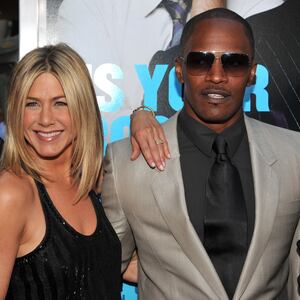Just a couple weeks after an infamous social media flub involving Jamie Foxx, Jennifer Aniston is back in the news for a Wall Street Journal profile where she discusses the upcoming season of The Morning Show, being a woman in Hollywood, and, inevitably, her thoughts on “cancel culture.”
“I’m so over cancel culture,” the Friends actress told the publication. “I probably just got canceled by saying that. I just don’t understand what it means.… Is there no redemption? I don’t know. I don’t put everybody in the Harvey Weinstein basket.”
The quote appears unprompted in the profile (although she does go on to discuss an uneventful encounter she once had with Weinstein on a set, where he pitched her a movie.) Even so, it wouldn’t be strange for a journalist to probe Aniston on the subject of cancel culture, considering it’s something she apparently can’t stop talking about.
Over the past few years, the actress has repeatedly publicized her gripes with the practice of “canceling” celebrities. On one hand, it makes total sense, given that The Morning Show heavily tackles the #MeToo movement; the topic would naturally be brought up in interviews while she’s promoting the show. And ever since #MeToo, journalists have routinely asked celebrities to weigh in on the discourse. On the other hand, all of Aniston’s opinions on cancel culture are notably bad and overly defensive.
It’s gotten to the point where social media is wondering why a beloved, generally inoffensive star with a dearth of public scandals is so concerned with getting canceled.
The obvious answer—or at least one of them—is that many celebs don’t actually seem to know what “canceling” means or what “cancel culture” actually looks like outside of heated Twitter, or X, discourse that typically lasts 48 hours. To be fair, in 2023, “cancel” is a barely legible term with inconsistent outcomes based on a number of factors (usually, how rich and male someone is).
For right-wing politicians and pundits, the phenomenon of “canceling” is usually spoken about earnestly and seen as an overreaction by liberals to things like racism and homophobia. Meanwhile, people on the left—although, I can’t speak for a very intense sector of online Gen-Zers—tend to treat the term with less seriousness. (It was coined, at least in its modern usage, on Tumblr, after all.) However, if you’re a major Hollywood celebrity like Aniston with “problematic” acquaintances and wealth to lose, you’re usually adamantly against it.
Just this past March, while promoting her Netflix comedy Murder Mystery 2, the 54-year-old star told AFP that the sitcom that launched her career, Friends, would inevitably be a victim of cancel culture—despite how much young people seem to love it.
“There’s a whole generation of people—kids—who are now going back to episodes of Friends and find them offensive,” she said. (To be fair, she did admit that there were certain elements of the show that the writers “should have thought [...] through.”)
However, in a New York Times profile in June about Aniston and her Morning Show co-star Reese Witherspoon, Aniston lamented people’s eagerness to instantly punish those accused of wrongdoing. “I hope we’re taking a moment to pause when agitated and to take each case as it comes and to use due process,” she said. “It’s too easy when, with one click of a button, someone just disappears.”
There was also a 2021 NPR interview where the actress was asked about her infamous 1998 appearance on the Late Show with David Letterman, in which the former TV host gets touchy with her and puts her hair in his mouth. In response to the video going viral and prompting backlash on the internet, Aniston said:
“That’s sort of what we’re dealing about in these different generations, you know? There were things that would happen that were kind of just acceptable. But it wasn’t—it was also in front of a live audience. There was nothing dangerous about to happen. I didn’t feel offended. I just felt this was a humorous, odd—very odd—thing for Dave Letterman to be doing. [...] But now we’re looking back and pulling stuff up from 20 years ago and going, ‘Can you believe?’ There’s a real black-and-white sort of approach now.”
While Aniston reserves the right not to be offended by something that happened to her, she seems content in misunderstanding how internet outrage actually functions in the lives of wealthy, nearly untouchable figures like Letterman, and how hindsight on things like sexual harassment and general inappropriateness is actually beneficial.
In recent weeks, her feelings about “cancel culture” and society’s quickness to condemn others has become downright ironic, given her clumsy remarks regarding a social media post by Jamie Foxx that was misinterpreted as antisemitic. After a weeks-long hospitalization that became the subject of conspiracy theories and seemingly false reports, Foxx posted the message, “They killed this dude named Jesus. What do you think they’ll do to you” with the hashtags #fakefriends and #fakelove.
After the account A Wider Frame called out Aniston for liking the post, she swiftly denied doing so, adding on her Instagram Story that she “do[es] not support any form of antisemitism.” Foxx later clarified that the post was about a fake friend, while social media users pointed out that “They killed Jesus” is a popular colloquialism in the Black community.
Now, after Aniston’s latest comments in WSJ, Twitter users are resurfacing the Foxx incident, pointing out that she was essentially participating in the “culture” she’s spent the past few years publicly condemning. Maybe now, she’ll finally refrain from discussing the topic altogether.








